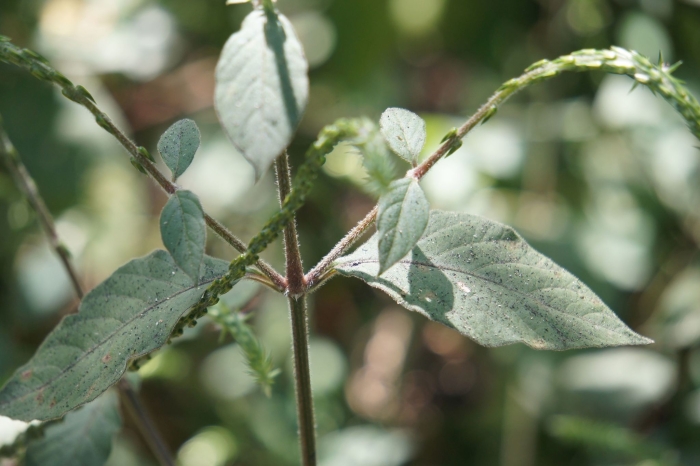Chaff-Flower
(Achyranthes aspera)
Chaff-Flower (Achyranthes aspera)
/
/

© Juan Carlos Pérez Magaña
CC BY-SA 4.0
Image By:
© Juan Carlos Pérez Magaña
Recorded By:
Copyright:
CC BY-SA 4.0
Copyright Notice:
Photo by: © Juan Carlos Pérez Magaña | License Type: CC BY-SA 4.0 | License URL: http://creativecommons.org/licenses/by-sa/4.0/ | Uploader: charro | Publisher: iNaturalist |























Estimated Native Range
Summary
Achyranthes aspera, commonly known as chaff-flower or devil’s horsewhip, is an annual herb native to the tropical regions of Australia, Asia and Africa, often found in disturbed sites, along roadsides, and in open grasslands. It typically grows to a height of 0.5 to 1 meter (1.6 to 3.3 feet) and has a somewhat erect, branching form. The plant produces small greenish flowers that are not particularly showy, arranged in dense spikes at the ends of the stems, blooming from summer to fall. The fruits are utricles that can stick to clothing and animal fur, aiding in seed dispersal.
Chaff-flower is valued in traditional medicine for its purported therapeutic properties, including diuretic and anti-inflammatory effects. It is used to treat conditions such as dropsy and snake bites. In cultivation, it is not commonly grown for ornamental purposes due to its weedy nature and potential invasiveness. However, it can be used in ethnobotanical gardens or for educational purposes. Achyranthes aspera prefers full sun to partial shade and is tolerant of a wide range of soil types, but it thrives in well-drained soils. It is drought-tolerant once established and has low water requirements. Gardeners should be cautious when introducing this plant to new areas, as it can become invasive, especially in some Pacific Islands and other tropical regions.CC BY-SA 4.0
Chaff-flower is valued in traditional medicine for its purported therapeutic properties, including diuretic and anti-inflammatory effects. It is used to treat conditions such as dropsy and snake bites. In cultivation, it is not commonly grown for ornamental purposes due to its weedy nature and potential invasiveness. However, it can be used in ethnobotanical gardens or for educational purposes. Achyranthes aspera prefers full sun to partial shade and is tolerant of a wide range of soil types, but it thrives in well-drained soils. It is drought-tolerant once established and has low water requirements. Gardeners should be cautious when introducing this plant to new areas, as it can become invasive, especially in some Pacific Islands and other tropical regions.CC BY-SA 4.0
Plant Description
- Plant Type: Shrub, Herb
- Height: 1.5-3 feet
- Width: 1.5-3 feet
- Growth Rate: Rapid
- Flower Color: N/A
- Flowering Season: Spring, Summer, Fall
- Leaf Retention: Evergreen, Semi-deciduous
Growth Requirements
- Sun: Full Sun
- Water: Medium
- Drainage: Medium, Fast
Common Uses
Erosion Control, Low Maintenance
Natural Habitat
native to the tropical regions of Australia, Asia and Africa, often found in disturbed sites, along roadsides, and in open grasslands
Other Names
Common Names: Prickly Chaff Flower, Burweed, Chaff-Flower, Chaffbur, Denge, Gnegna, Kalambata, Kongolikosi
Scientific Names: , Achyranthes aspera, Achyranthes acuminata, Achyranthes acuminata, Achyranthes argentea var. villosior, Achyranthes aspera f. nigrescens, Achyranthes aspera f. robustiformis, Achyranthes aspera f. subgrandifolia, Achyranthes aspera var. australis, Achyranthes aspera var. canescens
GBIF Accepted Name: